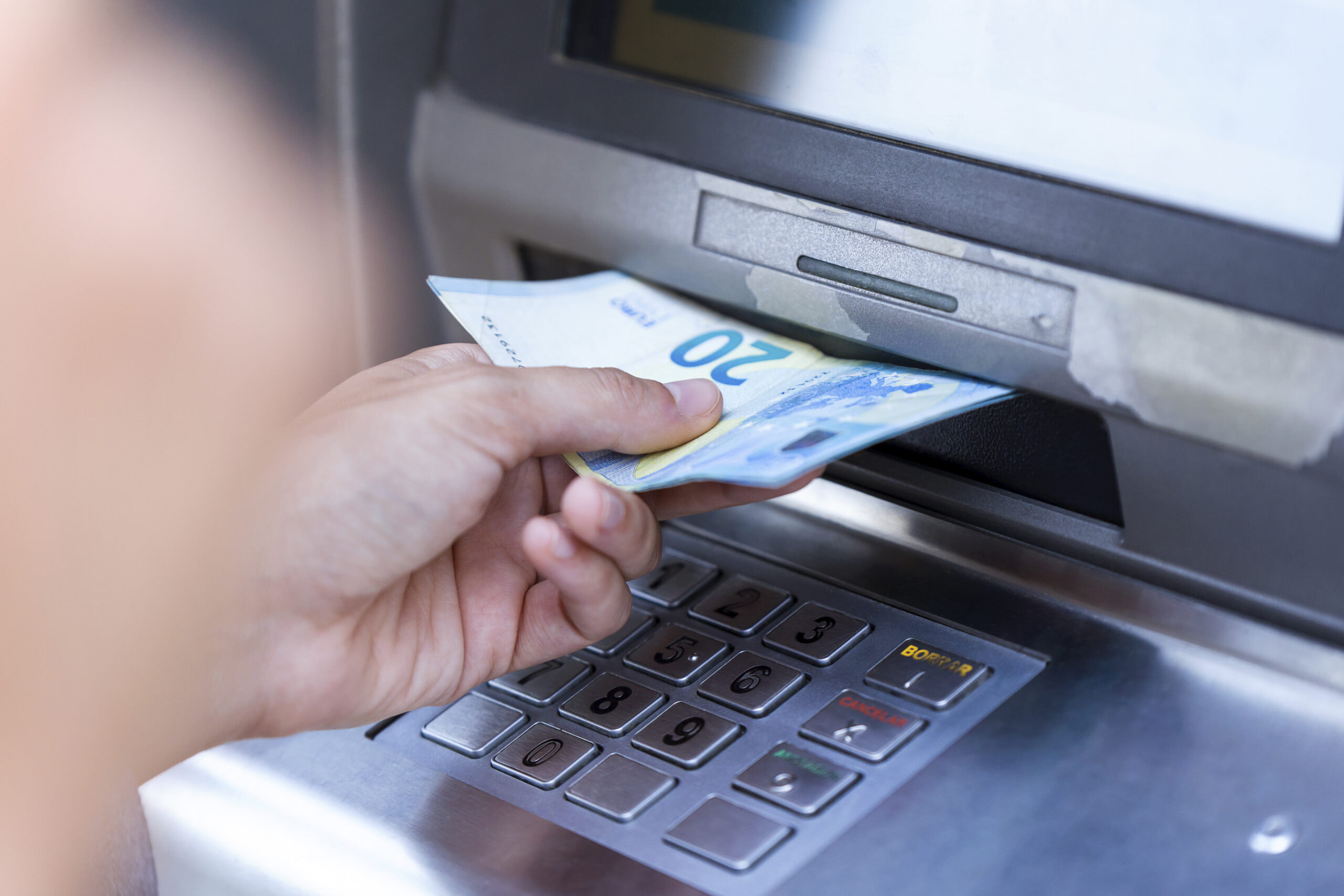Traveling abroad can be an adventure, but it can come with some uncertainty about how to handle currency. When visiting Spain, vacationers may wonder how to get local money at the best rate.
By researching ahead of time, you can pay fewer fees and have enough money to fund your trip. Options include getting money from your bank, an ATM in Spain, a currency exchange business, or from your credit card.
Read on to learn the pros and cons of each before deciding which is right for you.
Currency exchange options
Travelers may not know just how much money they'll need while traveling in Spain, so it pays to understand how each currency exchange option works.
Your bank or credit union
If you haven't left for Spain yet, plan a stop at your local bank. You can exchange your currency for the Euro (Spanish currency) at a better rate than most places. (Some banks even offer discount fees to their own customers.)
Of course, this means carrying a lot of cash around with you, and some people won't feel comfortable taking all that they need for an entire trip. Consider what you can safely take with you.
While you're there, talk to your bank about your upcoming travel plans and ask questions about their debit card policies. (More on that below.) You'll want to know about fees associated with using it at ATMs. It also can't hurt to tell them when you'll be traveling. They can make a note on your account so your purchases in Spain aren't flagged as suspicious.
Spanish bank
You might also exchange your American dollars for Euros when you arrive in Spain. A local bank there may offer a fair exchange rate, but could charge high exchange fees since you are not a customer there. Some Spanish banks also may only serve their own customers and could refuse to do business with you at all. Banks may also not be as convenient to get to as some other options.
ATM
Since they are located all over Spain, ATMs make a convenient way to exchange currency. You can simply withdraw from your own bank account using your own debit card, and the Spanish ATM will charge a fee similarly to how an out-of-network ATM would in the States.
Compared to currency exchange businesses, the ATM fee can be lower. Ask your home bank or credit card company if they belong to a special foreign ATM network called the Global ATM Alliance. If so, and you are a customer of Deutsche Bank, you could withdraw funds from Spain's Deutsche Bank-branded ATMs without a fee.
What about airport ATMs? While they have gotten a bad reputation for charging more than bank ATMs, they may still be more affordable than a currency exchange store. ATMs give you the real exchange rate and not an inflated one. Even if you have to pay an ATM fee, it's usually per transaction. You could pull out a lot of money at once, pay the fee just one time, and still get a very good deal compared to a money changer.
You could use credit cards at an ATM, but this may have the highest fees of all the options. When making a cash withdrawal, you are actually making a cash advance, which can come with high fees and high interest rates. Consider this option only if you need cash from an ATM right away and have no debit card handy.
Credit cards
Credit cards are extremely convenient to use in Spain, as they are accepted in many places and don't require you to carry additional cash. However, using credit cards often comes with high fees, including foreign transaction fees charged by the issuing bank.
When making a purchase with credit, ask the retailer to charge you in the local currency, not your home currency. That way, you avoid the very expensive exchange rate fees that get added on top of the rate and foreign transaction fees.
Prepaid debit cards
When you preload money to a prepaid debit card, you ensure you don't go further into debt (unlike a credit card). In many cases, there will still be foreign transaction fees, but the bank will honor the real exchange rate so you get to keep more of your money.
Prepaid debit cards are also very secure, which is something people appreciate when traveling. You can check your account's daily balance online and know how much of your vacation fund you still have left to spend as you go. For those who are uncomfortable carrying around a lot of cash, this may be a great alternative.
It's also possible to reload the card as you travel using the card's online account or app. By connecting it to another money source, you can transfer funds to the prepaid card and continue on with your travels without interruption.
Currency exchange offices
These small shops are located almost everywhere a tourist may visit, making them very convenient. However, expect to pay for that convenience, as these retailers make their money from fees and charge more than banks or post offices. (In fact, if you see them in the middle of a very busy tourist area, assume they will have the highest fees and most unfavorable terms for exchanging currency. They benefit from the convenience they offer travelers.)
They also may not give you the most current or favorable exchange rate, so you lose a little each time you use them. If you have to stop at one of these locations, only exchange what you need until you can get to a more affordable destination, and feel free to barter a bit for their services. They have some flexibility with their fees.
Online currency exchange
With the digital economy making apps for everything, you can now exchange money easily online without ever having to touch cash. These currency exchanges can give you good exchange rates and even show you their transparent pricing so you're not surprised by fees.
These currency exchanges allow you to transfer money from your online bank account in your home country to a convenient retail location in Spain. You can pick up the funds in person by showing your ID, and it's typically much cheaper than using a dedicated retailer in the marketplace.
The online exchange may also support funding from a digital wallet, credit card, or debit card, giving you lots of options for getting Euros when you need them quickly. Transfers can take just minutes, in some cases.
This is also a good option for having friends and family members send you money, especially if you'll be in Spain for a long time. They can set up a transfer and have it paid out to your bank to be withdrawn from an ATM.
To get even more from an online currency exchange, consider using a digital wallet or multi-currency account.
Digital wallets let you put different currencies in the same app and switch between them instantly. The fees are generally lower than traditional banks or money changers in the Spanish marketplace. They also support contactless payment and reduce the need to carry around a lot of cash.
Post office
The Spanish post office, known as Correos, offers currency exchange services for an affordable fee. They also have delivery service, so you can order your currency and have it sent to you.
Additional benefits of the Correos delivery service include:
- Theft insurance (up to €300)
- Luggage search
- Insurance against fraudulent card use
- Money back guarantee
- Shipping is free on orders of €500 or more.
More tips for finding favorable exchange rates
If you have friends or family in Spain, ask them for the best places to get cash. They likely have their favorite banks or ATMs and can assist with how to get there.
You may also check with the hotel front desk or a trusted tour guide about how to affordably exchange currency. They can often advise on the places that cost the most, so you can avoid them in the future.
While blogs and articles can give you ideas for where to exchange, they may not be updated. Checking with the locals is still the most updated way to learn and can even alert you to new locations for exchanging currency.
How to get a better exchange rate in Spain
Whether you're visiting Spain for a few days or a few months, you'll need plenty of Euros on hand to buy the things you need. The cheapest way to get them is through a currency exchange at your local bank before you ever leave the country.
If you're in Spain and need cash, you have other options, including ATMs and using your credit card. Of course, each method has its own fees, so ask questions to understand what they cost before you try them.
Keep your exchange receipts and all your documentation so you have a record of what you paid in exchange fees. You may need them if you need to dispute a transaction or seek reimbursement from your bank or an employer.



